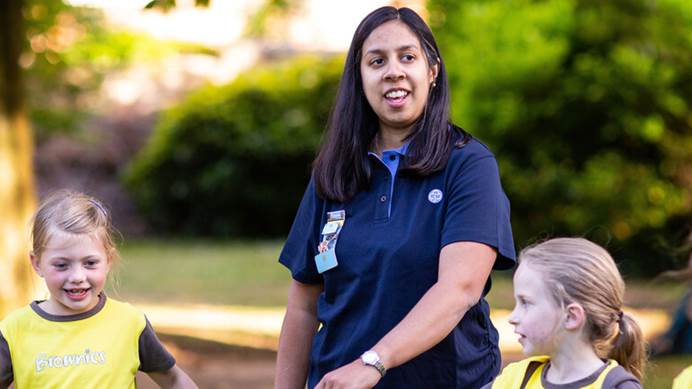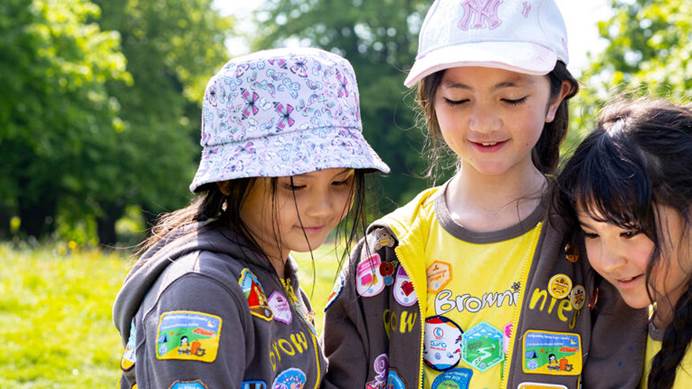Anti-bullying and harassment policy
We strongly believe that no form of bullying or harassment is ever justified
Page last updated 2 April 2025.
See change log for recent updates to this webpage.
This policy is what we do to stop and prevent bullying and harassment, and ensure that Girlguiding is a safe and rewarding space for all.
This policy applies to all adult volunteers and adult members (all referred to as volunteers in policies), and staff in Girlguiding.
It explains our commitment to anti-bullying and harassment, our expectations for volunteers and staff, and how Girlguiding manages and responds to cases of bullying and harassment.
Volunteers should read this policy alongside the anti-bullying and harassment procedure. Girlguiding employees should use the staff procedure on the intranet.
Definitions used in this policy
Our glossary lays out a few definitions of key terms that are used across our policies – take a look.
- Bullying - deliberate behaviour that causes physical or emotional harm to another person or people. It happens repeatedly, even when asked to stop.
- Characteristics - parts of someone’s identity. The Equality Act 2010 makes it illegal to discriminate against someone because of some characteristics. These are known as protected characteristics.
- Harassment - unwanted behaviour which someone finds offensive, makes them feel intimidated or humiliated, or creates a hostile or degrading environment.
- Inappropriate behaviour - includes harmful behaviour like bullying and harassment, unsafe behaviour, as well as behaviour which is disruptive to an activity or others. Relational conflict isn’t considered to be inappropriate behaviour, unless it’s ongoing and unable to be resolved.
- Relational conflict – conflict which doesn’t fit the definitions of bullying or harassment, and is often accidental or unintentional. It can be sparked by a clash of personalities or by a buildup of incidents that cause tension.
- Statutory agencies - includes the police, children’s social care, and designated officers (including Local Authority Designated Officers) and multi-agency safeguarding hubs.
Girlguiding’s commitment to anti-bullying and harassment
Girlguiding is committed to being a safe and welcoming environment for all. Bullying or harassment by or towards volunteers or staff is unacceptable. We take a zero tolerance approach to bullying and harassment. This means we take every concern seriously, no matter who reports it, or who’s being reported. This includes sexual harassment.
We recognise that some cases of bullying may involve an imbalance of power, or the perceived imbalance of power between the bully and the bullied.
We are committed to valuing and celebrating different experiences and characteristics. Any harassment directed at someone because of a characteristic protected by our equality and diversity policy is a breach of both this policy and our equality and diversity policy.
Whilst this policy doesn’t apply to young members or their parents or carers, we recognise that our volunteers may have to respond to concerns or cases of bullying, harassment, relational conflict, and inappropriate behaviour from and between young members, or their parents or carers. Please see the anti-bullying and harassment procedure for how volunteers must respond to this.
Bullying or harassment directed at children is considered a safeguarding concern and will be treated as such.
Expectations
All volunteers and staff must:
- Report any concerns about bullying or harassment. Volunteers must report concerns to the complaints and compliance team. Staff must report concerns to their manager or human resources.
- If your concern is about bullying or harassment directed at a child, please see our safeguarding policy and procedure for more information.
- Promote inclusive behaviour in line with our values and challenge those who don’t, if you feel safe to do so.
- Treat everyone with dignity and respect, and follow our equality and diversity policy.
- Follow effective safeguarding behaviours.
- Be aware of behaviour that suggests possible bullying or harassment to help you recognise concerns.
- Respond to incidents of relational conflict locally. Local commissioners can help if you need it.
- Deal with incidents in a timely and transparent way.
How Girlguiding manages and responds to cases of bullying and harassment
- We take all bullying and harassment concerns seriously. If you aren’t sure whether something is bullying or harassment, or just need some help, get in touch. The complaints and compliance team reviews all concerns, and decides which HQ team is best placed to handle them. If the concern relates to a protected characteristic, the inclusion team will be informed and may advise on actions to be taken.
- We have a duty of care to our volunteers. If any volunteer experiences bullying, harassment, or other inappropriate behaviour from a parent or carer of a young member, this could lead to the young member having their membership withdrawn.
- We investigate concerns about volunteers in line with our investigation procedure. If a report about bullying or harassment needs to be referred to a statutory agency, we’ll manage the case in line with our safeguarding policy and procedure. We may not be able to keep everything confidential, for example if there are concerns about someone’s safety. But we’ll only share details of your concern with those who need to know.
- Breaches of this policy by adult volunteers will be managed under the managing concerns about adult volunteers policy and procedure. Staff breaches will be managed in line with the relevant human resources policy and/or procedure.
- We recognise that reporting possible bullying or harassment may be difficult or uncomfortable. Our whistleblowing policy and procedure supports everyone in Girlguiding to feel safe and confident to report wrongdoing.
Change log
April 2025 - updated version published. The policy has been reformatted. Bullying or harassment directed at adults must be reported to the complaints and compliance team. Bullying or harassment directed at children must be reported to the safeguarding team using our safeguarding policy and procedure. Commissioners can support you to manage relational conflict locally.



